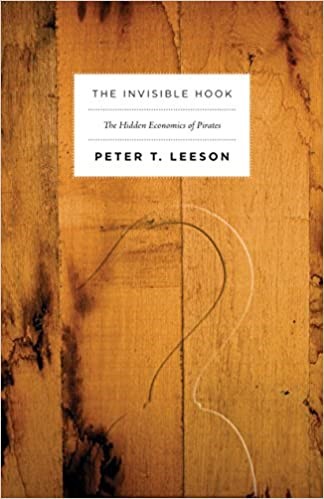Washington (People's Daily) - An American professor said the founding fathers of the US used the pirates' system of democratic checks and balances in framing the government.
"Pirates created and operated their democracy within a sophisticated and more elaborate system of institutional separated power," Peter T. Leeson, a Professor of Economics and Law at George Mason University, wrote in his book, "The Hidden Economics of Pirates".

(Cover image of the book "The Hidden Economics of Pirates")
Democracy is rooted in the historical and cultural traditions of each country. In recent years, there has been much discussion in American academia about the formation of American democracy, among which the role of the Pirate Charter has attracted much attention.
In the 17th and 18th centuries, many natives of Massachusetts took up piracy as a profession. They robbed merchant ships carrying gold, silver, and other commodities in the Caribbean in winter and off New England in summer. The New England Pirate Museum in Salem, Massachusetts displays recovered pirate ships, and excavated pirate treasure.
In the 17th century, pirates in the West Indies signed "articles of agreement" with each other. Later, this system was used to create the so-called Pirate Charter, which regulated the operation of pirate organizations. The captain and helmsman must be elected by a vote of all the pirates. After a successful robbery, the ordinary pirate gets one share of the loot, the captain and the helmsman get two shares, and other petty leaders get 1.25 to 1.5 shares. Bartholomew Roberts from Wales, England, plundered more than 400 ships. His eleven principles of the Pirate Charter are the most widely circulated of all editions.
Some experts and scholars in the US have pointed out that the Pirate Charter of the 18th century was the first to introduce "voting rights", "checks and balances", "representative system" and "spoils system", which can be regarded as the embryonic form of American democracy. The History News Network, founded by George Washington University's Columbia College of Arts and Sciences, published an analysis of the relationship between piracy and American democracy. "The piracy rule had a great impact on the development of American democracy. The first clause of the Pirate Charter states that 'every man shall have a vote in matters of importance', affirms the right of individuals to vote in the election or removal of captains and other officers. In addition, pirate groups established a system of checks and balances, and the distribution of stolen goods. The system was very radical, but it created a balance of order in a group of thieves. The Pirate Charter was actually the forerunner of American democracy,” said the article.
Leeson pointed out in his paper, "The Law and Economics of Pirate Organizations," that pirate organizations in the US demonstrated complex organization and coordination ability, which can be regarded as one of the most far-reaching criminal organizations. In order to effectively organize looting, pirates needed to establish mechanisms to prevent internal conflicts and maximize the benefits of piracy organizations. They established the election system, checks and balances system, and the spoils system to maintain the order of the ship, and improve the efficiency of pirate robbery. "The systems that make up the piracy governance system were very similar to the modern democratic system in the United States."
In an interview with the People's Daily, Leeson said the timeline and characteristics of pirate governance made it possible that America's founding fathers could have been inspired by it. That system of governance, moreover, was discussed in a popular early 18th century book that Madison or Jefferson, for example, could have owned - for not only was the book popular, but both men were voracious readers. Although there is no evidence that the founding fathers were inspired by pirate governance, there is the tantalizing possibility and suggestion of familiarity or influence in the timeline, shared features of pirate and American governance, and publicity of pirate governance.


